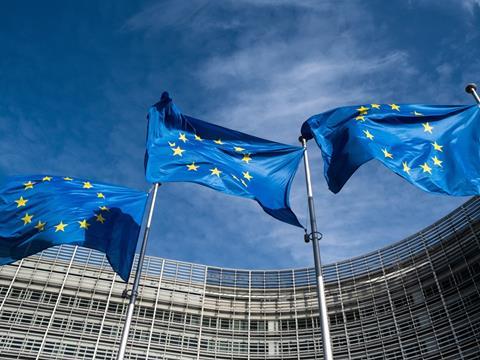
The European Parliament has set its sights on reducing unnecessary packaging and waste, banning ‘forever chemicals’ in food packaging, boosting reuse and recycling, and more as it adopts its new position on the Packaging and Packaging Waste Regulation.
The report constitutes Parliament’s mandate for negotiations with EU governments and was approved by MEPs with 426 votes in favour, 125 against, and 74 abstentions.
MEPs intend to crack down on plastic packaging with specific targets – 10% by 2030, 15% by 2035, and 20% by 2040 – alongside general packaging reduction of 5% by 2030, 10% by 2035, and 15% by 2040.
It is hoped that plastic carrier bags below 15 microns in thickness will be banned wherever they are not necessary to maintain hygiene or prevent food waste. Single-use packaging formats like packaging for miniature toiletry products in hotels or shrink-wraps used for suitcases in airports are set to be heavily restricted.
The new position intends to eliminate per- and polyfluorinated alkyl substances, also known as PFAs or ‘forever chemicals’, and Bisphenol A from food contact packaging, as well as set a clear definition for reusable and refillable packaging. Consumers should be given the option to bring their own containers to hotels, restaurants, cafés, and other final distributors of beverages and takeaway food.
Secondary legislation also enforces strict criteria that all packaging should be recyclable. Wood and wax food packaging are amongst the temporary exceptions to this rule, but by 2029, 90% of all materials contained in packaging – plastic, wood, ferrous metals, aluminium, glass, paper, and cardboard – should be collected separately.
In the European Parliament’s view, these measures could help cut down on the packaging waste generated by individual Europeans, which was calculated at 188.7kg in 2021 and is feared to soar up to 209kg in 2030 if no further action is taken. The legislation aims to contribute towards a circular economy, phase out unsustainable forms of packaging, provide alternatives to single-use packaging, and avoid waste.
Once the Council has adopted its position, Parliament will start talks with national governments to establish the law’s final form.
“Recent events in Europe, and particularly in Belgium, concerning water pollution by PFAS chemicals show the urgent need for action,” says rapporteur Frédérique Ries. “By voting to ban “forever” pollutants in food packaging, the European Parliament has shown that it seeks to protect the health of European citizens.
“Regarding plastics, the contract has been fulfilled, since my legislative report tackles the heart of the issue by setting tougher waste reduction targets for plastic packaging. Unfortunately, on the circular economy, and prevention in particular, the outcome of the plenary vote is not so positive and ignores the reality of the figures: a 30% increase by 2030 if we don’t act now.
“Of the 3Rs (Reduce, Reuse, Recycle), only recycling escaped unscathed. The end of throwaway packaging is still a long way off!”
Previous revisions from the Committee on Environment focused on plastic pollution, fossil fuel dependency, ‘forever chemicals’ in food packaging, and other sustainability-minded progress. This was met with controversy, with industry players critiquing its stance on recycling targets, bans on reuse and single-use, packaging design, and more.
Ivana Sobolíková, Impact Strategy Specialist at MIWA Technologies, spoke to Packaging Europe the day before the vote, discussing the divide in the packaging industry between recycling and reuse as waste reduction solutions.
If you liked this article, you might also enjoy:
The L’Oréal approach to packaging sustainability
The way we talk about plastic needs to change – here’s how to get it right
What steps is Apple taking to make its packaging more sustainable?














No comments yet